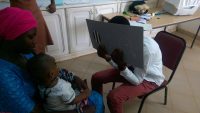Arriving into the lecture room this morning led to two dismaying revelations: one that we are now halfway through our short time at SZRECC, and the other that today was my turn to present a talk to the hospital staff and students. Dave gave a useful talk on examining children’s eyes, and then I followed up with a talk covering the topic of amblyopia (lazy eye). Amblyopia isn’t an immediately obvious problem affecting the Gambia, and so far I have not seen even one child resembling the amblyopic patients I see back in Swansea. The level of pathology here is a real step up in severity and complexity, and there’s little in the way of traditional orthoptic work. That being said, awareness of the condition is doubly important here, as there is a much higher risk than in the UK of patients losing the sight in their good eye at some point, and being left visually impaired as the lazy eye has no usable vision.
I then proceeded to clinic, where another packed roomful of patients were already awaiting our arrival. The corridor outside the consultation rooms was also heaving with patients brandishing appointment cards, a few harangued staff members, and several despondent children already looking fed up with the wait.
I used today as a chance to put yesterday’s teaching into practice, and although the clinic was busy, we had sufficient time with each child to assess visual acuity, check for and measure squints, and assess the eye movements.  Again I was with Mam, the nurse who usually assesses the children, and Dou the optometry intern, both of whom had absorbed all of the tuition and used it to great effect. By 2 o clock, we’d seen 21 patients without stopping, many of them complicated cases with
Again I was with Mam, the nurse who usually assesses the children, and Dou the optometry intern, both of whom had absorbed all of the tuition and used it to great effect. By 2 o clock, we’d seen 21 patients without stopping, many of them complicated cases with  conditions such as congenital cataracts and corneal lacerations. The clinic ran smoothly, and I was also pleased to see many of the children apparently enjoying their trip to the hospital, not something commonly seen here.
conditions such as congenital cataracts and corneal lacerations. The clinic ran smoothly, and I was also pleased to see many of the children apparently enjoying their trip to the hospital, not something commonly seen here.
One of the bigger problems facing the Gambia at the moment is the lack of stable power supply, and this is especially obvious in the hospital. Luckily for the operating theatre and ward there are back up fuel generators for when a power cut occurs, but the rest of the clinics have to wait in humid darkness until the electricity returns. If anything, seeing how regularly the power abruptly  cuts out has really emphasised the importance of one facet of Paul’s maintenance talk yesterday. He strongly advocated wider usage of UPS (universal power supply) systems, surge protectors and voltage stabilisers, to protect the machinery from any wild fluctuations in energy which can damage the delicate circuitry. This is of course one reason why technology fails so much quicker than normal here, and unfortunately does lead to some patient harm when they are unable to have certain tests because the machine is broken again. Hopefully the changing fortunes of the whole country will soon lead to better conditions in the hospital too (also if they just fitted solar panels to the roofs they would be sorted for life!).
cuts out has really emphasised the importance of one facet of Paul’s maintenance talk yesterday. He strongly advocated wider usage of UPS (universal power supply) systems, surge protectors and voltage stabilisers, to protect the machinery from any wild fluctuations in energy which can damage the delicate circuitry. This is of course one reason why technology fails so much quicker than normal here, and unfortunately does lead to some patient harm when they are unable to have certain tests because the machine is broken again. Hopefully the changing fortunes of the whole country will soon lead to better conditions in the hospital too (also if they just fitted solar panels to the roofs they would be sorted for life!).

